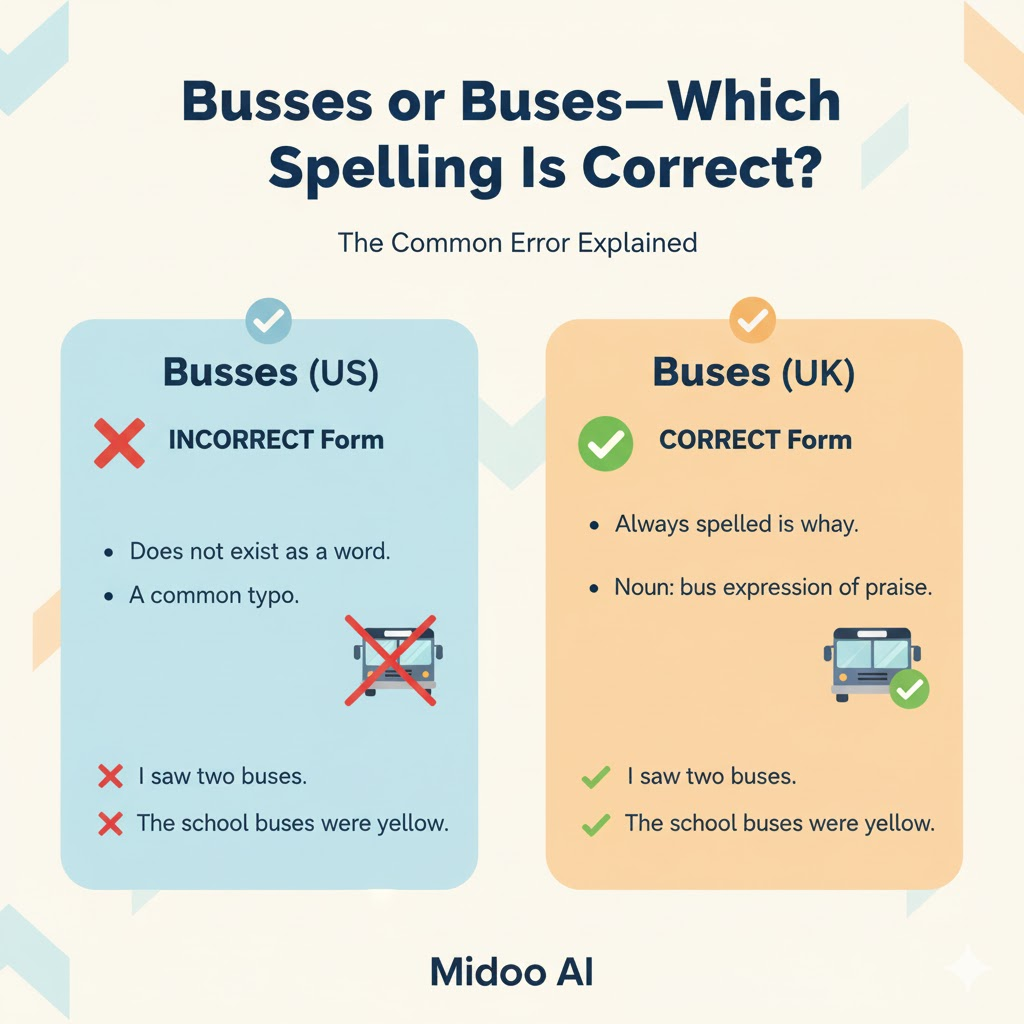Busses or Buses—Which Spelling Is Correct?

If you’ve ever paused while typing busses or buses and wondered which is correct, you’re not alone. These two words look almost identical, but only one of them is usually right in modern English.
At Midoo AI, we know English spelling can be tricky, especially with words that change forms irregularly. Let’s break down the difference between busses and buses, when each one should be used, and how to remember it easily.
1. The Short Answer
✅ Buses is the correct and standard plural of bus.
🚫 Busses is rarely used—and only correct in a completely different context.
Examples:
- I missed two buses this morning.
- The city added new buses to its route.
- Students lined up to board their buses after school.
2. “Buses” — The Standard Plural Form
In both American and British English, the plural of bus is buses.
This follows the general English rule: nouns ending in -s, -sh, -ch, -x, or -z add -es to form the plural.
✅ Examples:
- The buses are always crowded during rush hour.
- Our company operates 25 electric buses.
- Two school buses arrived early today.
Tip: If you’re referring to vehicles that carry passengers, always write buses—no exceptions.
3. “Busses” — A Different Meaning Entirely
While busses was once considered an alternate plural spelling of bus, it has fallen out of use.
Today, busses is typically used as the third-person singular or plural form of the verb “to buss,” which means to kiss lightly.
✅ Examples (verb “buss”):
- She busses her child goodnight.
- The newlyweds bussed on the dance floor.
- He gave her a quick buss before leaving.
So if you write busses instead of buses, your reader might picture kisses, not vehicles! 😄
4. Quick Comparison Table
| Meaning | Correct Word | Example |
|---|---|---|
| More than one bus (vehicle) | Buses | The city added more buses to the schedule. |
| Kisses (verb “to buss”) | Busses | She busses him on the cheek. |
5. Why the Confusion Exists
Historically, both spellings appeared in print. Early dictionaries listed busses as a variant plural of bus, especially in British English during the 19th century.
However, by the mid-20th century, buses became the dominant and accepted form worldwide.
Today, major style guides—including AP, Oxford, Cambridge, and Merriam-Webster—all recommend buses as the only correct plural for bus.
6. Common Mistakes to Avoid
❌ Incorrect: There were three busses waiting outside.
✅ Correct: There were three buses waiting outside.
❌ Incorrect: The airport busses passengers to the terminal.
✅ Correct: The airport buses passengers to the terminal.
(Even when used as a verb meaning “to transport by bus,” the correct form is still “buses.”)
7. Grammar Tip from Midoo AI
💡 Remember:
- If it’s about transportation, write buses.
- If it’s about kissing, write busses.
Think of it this way:
“A bus takes you places; a buss makes you blush.” 😄
8. Real-Life Examples
- The school district purchased 20 new buses for next year.
- Tourists boarded the buses heading to the museum.
- The wedding guests cheered as the couple bussed affectionately.
- Our company buses employees to the city center every morning.
FAQS
Q1: Is “busses” ever correct for transportation?
Technically, it was acceptable long ago, but in modern English, buses is the only correct plural form. Use busses only if you mean “kisses.”
Q2: Do British and American English differ on this?
Not really. Both prefer buses for vehicles. You might still see busses in old British books, but it’s outdated.
Q3: What about “bus’s” or “buses’”?
Those are possessive forms:
- Bus’s = singular possessive (e.g., The bus’s driver was friendly.)
- Buses’ = plural possessive (e.g., The buses’ routes were updated.)
Q4: Can “bus” be used as a verb?
Yes! Example: The hotel buses guests to the airport.
And the verb forms follow the same spelling—buses, bused, busing (not busses or bussing).
Q5: Why do people still write “busses”?
Because it looks logical! Many learners assume “bus” should double the “s” like kiss → kisses, but bus follows a different rule.